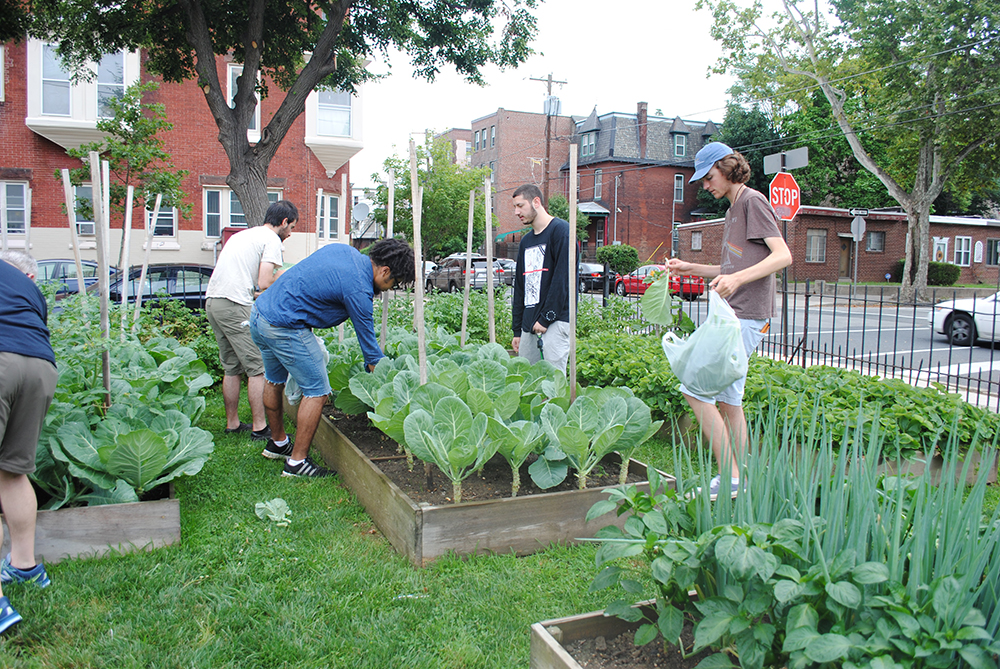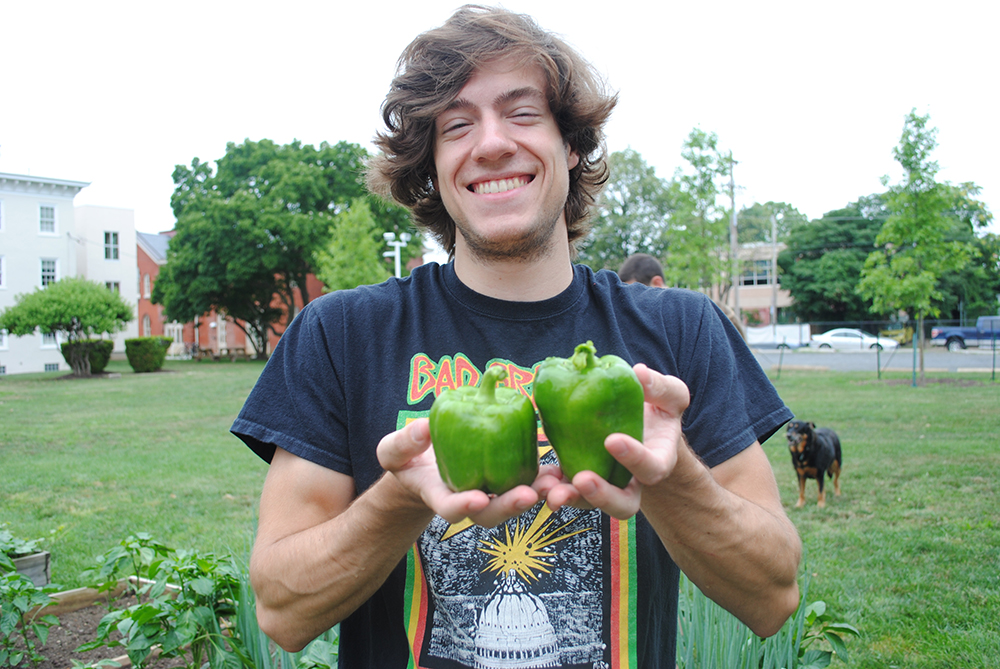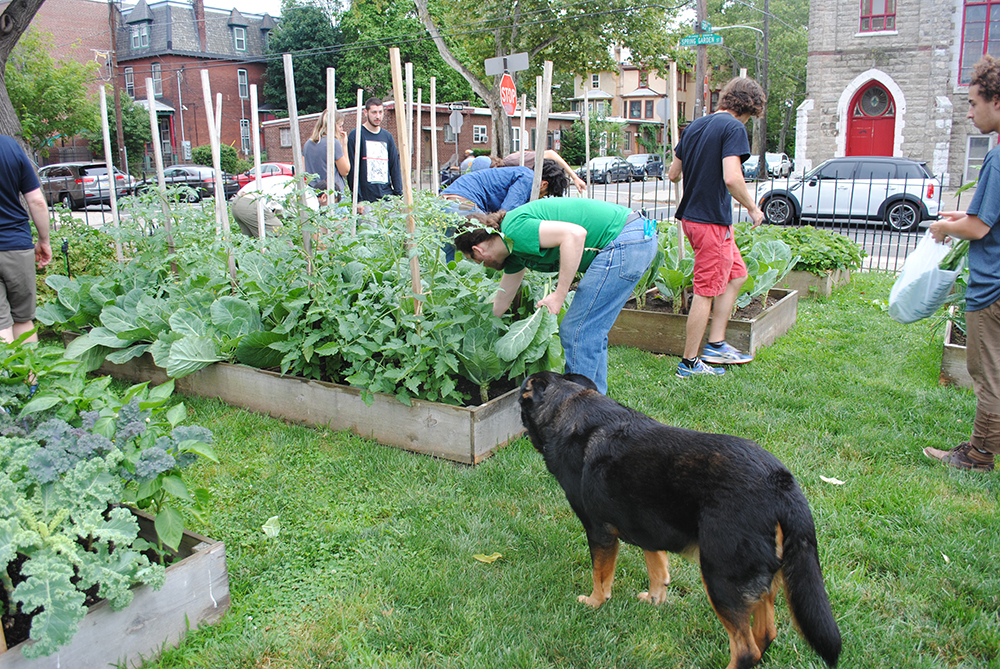Posted on 10 March 2016.
Chefs and hospitality professionals from around the nation gathered for two days at the third annual Philly Chef Conference. Hosted by Drexel University Center for Hospitality and Sport Management, the conference encouraged conversation, networking and experiential learning for everyone in attendance. Run entirely by student volunteers and the center’s faculty and staff members, the conference saw about 300 attendees each day.
On March 6, five lecturers spoke on various topics in food industry such as hunger, the history of the cocktail, and the history of food science.
“Today is a perfect example of how Drexel University really bridges the gap between education and industry,” Michael Traud, the conference chair, said in his opening remarks. Traud has been helping to organize the conference since its inception.
The conference started off with speaker Solomon Katz, a doctoral student from the University of Pennsylvania. Katz, a leading expert in the anthropology of food, in his talk titled “Six Mega Trends That Leading Chefs Need to Know,” focused on issues such as climate change, hunger, food waste, and the connections between these issues. He emphasized the changes that chefs and restaurant owners could make to help reduce food waste. “Chefs are the carriers of the knowledge that is going to be required to continue to succeed in this world of ours,” Katz said in his talk.
Continuing the discussion on hunger and reduction of food waste in a different way, Mariana Chilton gave a talk entitled “Sharing Food and Fellowship: A Meaningful Solution to Hunger in our Neighborhoods.” Chilton is the director of the Center for Hunger-Free Communities at The Dornsife School of Public Health and is also currently involved in the opening of a new restaurant at 3820 Lancaster Ave. The new spot, called EAT Cafe, will function as a pay-what you-wish style dining spot. EAT stands for “Everyone At the Table,” a name that reflects the hope that those from surrounding areas who might suffer from hunger or food insecurity come and eat a nutritious meal financed by payments from those who can afford to spend a larger sum on a meal.

Ann Haftl: The Triangle
Chilton discussed the danger and prevalence of food insecurity in urban centers such as Philadelphia, Washington D.C., Baltimore and Trenton. She brought up important statistics on hunger, stating that 14 percent of Americans, which amounts to 49 million people, were suffering from food insecurity in 2015. Chilton also founded the program Witnesses to Hunger to connect those who have suffered from hunger and food insecurity with policy makers in an attempt to fight for more positive policy addressing hunger in America.
Two other lectures from the first day of the conference changed the tone a bit, focusing on the history of food and drink. Derek Brown, the chief spirits advisor to the National Archives and organizer of the exhibit “Spirit of the Republic” came to the conference to discuss the history of the cocktail. Discussing such time periods like The Golden Age of the Cocktail, The Tiki Period, The Dark Age of the Cocktail and The Platinum Age of the Cocktail, Brown covered a brief history of cocktails in America. “I do believe cocktails are part of the culinary world, that what we do as bartenders is very similar or a subset of what chefs do,” Brown added.
Keynote speaker and author of the book “On Food and Cooking: The Science and Lore of the Kitchen” Harold McGee also spoke a bit about the integration of food science into mainstream scientific endeavors from a historical perspective. When food science first really began to emerge, McGee explained, it fought hard to be recognized as a scientific study, taking on the name of molecular gastronomy in order to be taken more seriously. Original testing had no route through which to operate except to observe the effects of certain food ingredients or additives on people willing to eat them.
McGee also discussed the transition from older traditions of plating food as a show of entertainment for guests to that of plating food in the kitchen so that it is sure to arrive at the table still hot as a key point in history.
“That changed everything. Now the chef could be an artist… it became an opportunity for the chef to control what the diner experiences much more closely,” McGee explained. He concluded that now, more than ever, the world seems to be reaching a golden age of food science, stating that Drexel’s food science program and others like it serve as evidence of this.

Ann Haftl: The Triangle
The fifth speaker of the Sunday session was Anthony Rudolph, founder of Journee and the Welcome Conference on Hospitality. Speaking on a unique topic, Rudolph brought up the importance of community and fellowship in creating the best experience possible for both those in industry and the customers. “Every restaurant exists to nourish and to nurture,” Rudolph said.
Rudolph stressed that professionals in the restaurant industry need to first focus on how they can build for themselves, focusing next on their team, their profession and, finally, their consumer. His basic thesis is built on the fact that unless the professional is producing what makes them happy, the consumer won’t be likely to enjoy the final product. Additionally, communities among professionals need to be built to strengthen the final product produced.
“We cannot continue to look outside of our community for external validation– change won’t happen that way … Too often we choose to compete and protect rather than collaborate and share,” Rudolph explained.
“Find your community and let them in,” he suggested instead, explaining that with a spirit of collaboration, the food industry can grow.
The second day of the conference found the sixth floor of the Paul Peck building packed with about 300 attendees. The day began with two morning sessions, followed by a lunch break and finished with four afternoon sessions, keeping the attendees busy from 9:30 a.m. till 4:30 p.m. The sixth floor was divided into four demo and lecture areas, and the hallways were packed with tables for sponsors to show off their wares and network with the attending chefs and student volunteers. These tables hosted many different samples of food and drink.
Little Baby’s ice cream created a new flavor just for the conference and this was available during the afternoon ice cream and coffee break. The flavor, “chocolate with caramel, pretzels, and peanut butter” was a hit among attendees. Also there to hand out samples were vendors like Shake Shack, La Colombe, Capogiro, and Sip-n-Glo Juicery.
The live demonstrations for the day were carried out in the bakery, and included demos on spice blends, converting potential food waste into usable dining resources, a gluten and bread baking demo, a pastry demo all about sweet treats, a gelato making demo, and a cheese tasting. Some of the lectures of the day included Question and Answer sessions with McGee and Rudolph, as well as several discussions about challenges and opportunities in the food industry, including a discussion on menu development and another on restaurant real estate. During the Q&A session, McGee talked about a new book that he is working on, which he thinks could be ready by late 2017 for publication. This book, he said, will emphasize the science of taste and smell.
“Very simply I wanted to help people taste and smell more, notice more about what they experience… To make it a kind of field guide,” McGee said.
There were also three separate beverage sessions in the academic bistro, ensuring that the bar was packed throughout the afternoon. Fittingly, these three sessions discussed wine, booze, and beer.
In the first session on wine, led by New York Times wine critic Eric Asimov, five wines were tasted: a French champagne by Ruppert-Leroy, a 2014 Trocken Riesling, a 2012 Derthona Vigneti Massa, a 2013 Nicolas Gonin Persan Mondeuse, and finally a Roland Pignard Regnie. Asimov had a lot to say about the last wine, a type of Beaujolais. In the past, he explained how Beaujolais was supposed to be a very fruity and sweet wine that was grown with an eye to quantity rather than quality of the grapes, since flavors were added during the fermentation process. Following a crash in the sales of Beaujolais, however, many of the farms producing these grapes were abandoned. However, some producers continued with traditional methods.
“Wine makers began to discover this small number of producers who were really dedicated to the craft of making good Beaujolais. In that time more people have discovered that Beaujolais is not the happy fruity knock-it-back jolly little wine of legend, but in fact can make a quite interesting, serious, age-worthy wine,” Asimov explained.
He continued to say that sometimes the reward of tasting new wines completely outweighs the risks.
“Don’t fear making mistakes. A lot of people that I talk to, the thing they want to avoid most of all is making a mistake with wine as if there’s some horrible consequence of opening a bottle of wine they don’t like… But to me there’s a lot to be gained just in the journey of exploring and tasting and linking wines to place and person and culture,” Asimov added.

Ann Haftl: The Triangle
In the cocktail session, hosted by Brown, three cocktails were created and taste-tested by the audience. The three cocktails were meant to epitomize 200 years of cocktail history, moving from the old-fashioned, to a Martinez, to an espresso martini. With assistants helping with the mixing, each of the drinks was concocted and passed out for tasting in the room. Later on, the beer tasting was hosted by John Holl, an editor of the All About Beer magazine.
In the food demos, several recipes were created for the audience to try. A specialty loaf of bread was distributed by Peter Reinhart in his session Consider the Carbohydrate: Gluten and Baking, as well as a batch of gluten-free cornbread. Later, Johnny Iuzzini, the author of Sugar Rush and the 2006 James Beard award winner for Outstanding Pastry Chef, made a traditional chocolate pudding with a special twist of his own, which the audience got to taste. Using the help of Drexel culinary students and a special gelato making machine, the puddings were ready by the end of the demo. Iuzzini also signed copies of his book Sugar Rush for the Drexel culinary students in attendance, making elaborate and unique doodles for each signed book.
The final activity of the conference, the cheese-tasting demonstration, was highly popular. Attendees were each given a plate of 10 cheeses to sample. The session, titled “Easy Being Cheesy: the World’s Most Perfect Food”, was moderated by Max McCalman, the author of Mastering Cheese. McCalman walked the participants through the cheese plate in an effort to really showcase the difference between cheese made with pasteurized milk and that made with raw milk. He showed that the taste and aroma of the cheeses made with raw milk were generally stronger and more diverse than those found in pasteurized milk cheeses. The cheeses on the plate represented five types, each a pair of raw milk and pasteurized milk. Starting with two samples of Taleggio cheese, McCalman pointed out the differences in aroma, texture, and taste. The raw milk version of the cheese had a softer pull-apart consistency, a stronger aroma, and a deeper, more complex and round flavor.
The volunteers were very busy throughout the weekend, which was confirmed by one of the volunteers, sophomore Hospitality Management major Emily Grace Hoffman. Getting to the conference location at 6 a.m. before the Monday session began, she helped to keep the flow of coffee steady. Hoffman emphasized the best part of volunteering at the conference was being able to network.
“Everyone’s so willing [to make connections] and they want to talk to us when they see us in our volunteer shirts… It’s just cool that everyone comes together to help us out,” she explained.
She also noted that a lot of the responsibilities for the conference fell on the student volunteers.
“I know the people who helped set this up, but it’s also kind of stressful because if something goes wrong it’s on our shoulders, not anyone else’s,” she said.
The Philly Chef Conference operates, in some capacity, as a fundraiser for the Center for Hospitality and Sport Management. This year a total of 53 sponsors donated their resources, food, beverages and contributed by providing speakers. All of the funds go to provide the Center with funds for projects such as their upcoming Academic Bistro renovations as well as continuing to provide extracurricular opportunities for students.
The post Serving up the Philly Chef Conference appeared first on The Triangle.












